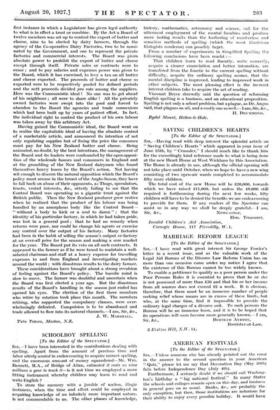SCHOOLBOY SPELLING [To the Editor of the SPECTATOR.] SIR,—I haVe
been interested in the contributions dealing with spelling. Apart from the amount of precious time and labor utterly wasted in endeavouring to acquire correct spelling, and the enormous amount of money squandered—Mr. Wm. Bennett, M.A., of Bridge of Allan, estimated it costs us nine millions a year to teach it—is it not time we employed a more fitting instrument whereby children may learn to read and write English
. To store the memory with a jumble of useless, illogic instances, when . the time and effort • could be employed • in acquiring knowledge of an infinitely more important nature, is not commendable to us. The other phases of knowledge, history, mathematics, astronomy and science, call for the uttermost employment of the mental faculties and produce more lasting results than the harboring of numberless and senseless methods of spelling (which the most illustrious ffiologists condemn) can possibly beget.
From a number of experiments in Simplified Spelling the following conclusions have been reacht :- That children learn to read fluently, write correctly, acquire a clearer enunciation and better intonation, are transfered from the fonetic to the current spelling without difficulty, acquire the ordinary spelling sooner, that the mental discipline is improved, leading to improved work in other subjects. The most pleasing effect is the increast interest children take to acquire the art of reading.
Viscount Bryce shrewdly said the question of reforming English spelling is a business, and an educational proposition. Spelling is not only a school problem, but a plague, as Dr. Angus said, that plagues us all, and a costly one as well.—I am, Sir, &c., H. DRUMMOND. Rydal Mount, Hetton-le-Hole.


































 Previous page
Previous page